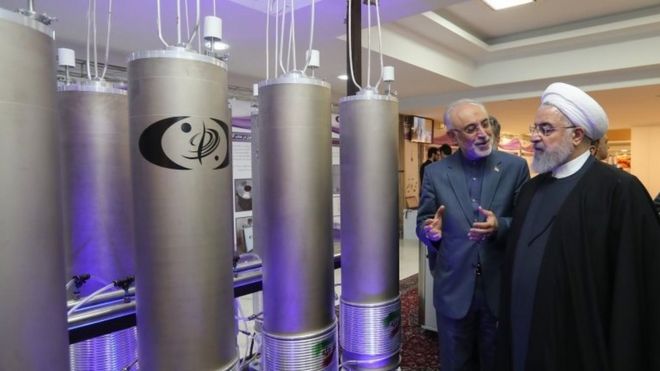
For a year now seeing that the Trump administration unilaterally withdrew from the agreement, a sort of "phoney diplomatic war" has been under way.
Iran and all the different events to the accord have carried on regardless of Washington's actions.
Indeed, the International Atomic Energy Agency, the international nuclear watchdog, has again and again given Tehran a easy consignment of health. Iran has been living up to its part of the bargain.
But Iranian compliance was not the issue for the Trump administration.
It simply believes that this is a very awful deal. Its primary European allies, alongside with Russia and China, disagree.
So the Trump administration has been ratcheting up the pressure on Tehran.
It has re-imposed many sanctions; it has specified the Islamic Revolution Guards Corps (IRGC) as a terrorist organisation; and, most recently, it has no longer renewed sanctions waivers that allowed quite a few international locations to proceed purchasing Iranian oil.
The pressure on Iran's economic system has been severe.
Both in phrases of responding to famous pressure at home and in an effort to relieve its worsening situation, the Iranian authorities has now determined to act.
It has taken the first anniversary of the US withdrawal from the settlement - acknowledged as the Joint Comprehensive Plan of Action (JCPOA) - to start putting conditions of its own.
Iran is pursuing what it sees as a deliberate and measured course.
First, it says it is no longer going to recognize restrictions on storing enriched uranium and heavy water.
Iran nuclear deal - all you need to know
two How reinstated sanctions have hit Iranians
two two Is it about to become more costly to fill my car?
And it has given a 60-day deadline to the closing international locations worried in the JCPOA to put into effect what Iran calls "their commitments", in particular in the banking and oil sectors.
If this closing date passes, then Iran will suspend restrictions on the degree of enrichment it is allowed to behavior and halt the modernisation of the Arak heavy-water reactor.
Iran is offering itself very a whole lot as the wronged party, compelled to act via unrelenting US pressure. And, if you ignore wider concerns about Iran's regional behaviour or its missile programmes - which, to be fair had been never part of the JCPOA - it has a point.
It has widely caught to the letter of the agreement. US sanctions that have been supposed to be lifted have been reimposed. Its economic system is struggling badly. Tehran is saying "enough is enough".
The strain now is squarely upon the Europeans - in specific the French, the British and German governments which helped to negotiate the deal.
Iran is charging them with now not having lived up to their promises.
They have to do something to relieve the economic pressure on Tehran or, after 60 days, it will move to stage two of its deliberate suspensions.
And there is an specific warning to the Europeans too.
Iran's President, Hassan Rouhani, has underlined his country's role in battle the smuggling of pills and in constraining the go with the flow of refugees into Europe. US monetary pressure, he insists, skill that Iran should no longer have enough money such activities.
So what can the Europeans do?
They have created an difficult mechanism to facilitate alternate with Iran. But it is doubtful how fine this has been.
Many corporations with an worldwide profile would decide on to keep away from the dangers and pick out exchange with the US over Iran.
European governments are in a double-bind.
Relations with Washington have already been soured through this issue. The US needs the JCPOA gone and it is hard to see how the Europeans can do enough through themselves to fulfill Iran to save it.
But equally the Europeans, in trying the nuclear deal to survive, can't enable Iran to continue to be in breach of its terms.
So a tough couple of months of diplomacy lie ahead.
Unless there is a fudge, it is tough to see the JCPOA surviving.
The Europeans need to craft some modest appreciation that gives Tehran the possibility to again down and return to full compliance. It cannot be only partly in the JCPOA deal. Washington's unilateral rejection of it at least had the gain of clarity.
Russia and China have been additionally key backers of the JCPOA.
They too have a diplomatic part to play, however Washington's function is inevitably causing extra tensions with Moscow and Beijing. Both governments have laid the blame for the JCPOA's troubles squarely at Washington's door.
The Trump administration must see its ultimate aim - the fall down of the JCPOA - as now being in sight.
It will additionally be making use of big pressure on its European partners who are caught between a rock and a difficult place.
The Europeans are to some extent ambivalent due to the fact they too are concerned about Iran's overseas policy, its guide for terrorism, and its missile and missile-export programmes.
This is the context in which tensions are rising.
US army warnings are intended to send an unequivocal message that any anti-US moves via Iran or its proxies will have solely one return tackle - Tehran.
Is Washington gearing up for a war? Not yet.
But the good judgment of the Trump administration's policy is unforgiving - either Iran radically changes its behaviour, or the US will do as tons as it can to bring the Iranian regime down.
The risk of conflict - albeit with the aid of accident rather than format - is growing.
And the fall down of the JCPOA will be some other step on the escalatory ladder.

0 Comments